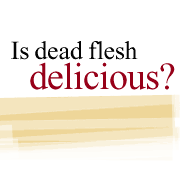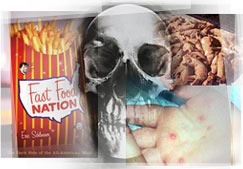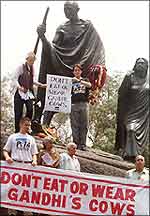The Rediff US Special/ Sonia Chopra and J M Shenoy


For many months Kirthi Desai had struggled to convince her seven-year-old son Rahul that it is immoral to eat meat or fish.
But it was not easy for the New York homemaker to teach vegetarian ethics to the boy.
"Everyone, practically everyone around him is a non-vegetarian," she says with a sigh. "And students of his age think it is odd he cannot eat like they do."
Now, Desai uses the news about the mad cow disease to buttress her arguments. Though the American meat industry has yet not been affected by the disease, the ravage it has caused in Europe is good enough to support her arguments against meat consumption. The spread of foot-and-mouth disease is yet another frightening warning to meat eaters.
For thousands of vegetarians of various ethnic backgrounds across America the cattle disease has made it easier to defend their choice.
In some ways, they are also helped by the best-selling book, Fast Food Nation, which has been widely reviewed on television and in newspapers and magazines. Author Eric Schlosser, who spent over three years working on the book, secretly visited scores of large slaughterhouses and meat packing facilities to discover nightmarish working conditions for mostly immigrant workers and shocking lack of hygiene.
Eaters beware, he notes at one point, forget your concerns about cholesterol, there is --literally -- faeces in the meat. He is also concerned how fast food giants such as McDonalds have made inroads into the lives of millions of school children in America, getting them hooked into burgers and French fries and making them prone to obesity and disease.
For Desai -- and thousands of people like her who have chosen vegetarianism for ethical and health reasons -- Schlosser offers practical remedies. "Eating in the United States should no longer be a form of high-risk behavior," he writes.
The fear of foot-and-mouth disease is another factor in favor of vegetarianism today. Since the first signs of the disease emerged in Britain where 45,000 animals have been slaughtered, a sense of caution has pervaded Italy, France and Germany.
Now Americans are beginning to ask questions: Can it happen here? How does it happen anyway?
Precautions are being taken: Since March 5, major airports have begun disinfecting shoes suspected to be contaminated with foot-and-mouth disease from passengers arriving from Europe.
For organizations like People for the Ethical Treatment of Animals (PETA), that decry animal exploitation for food, the epidemic of animal disease is yet another warning against eating meat.
Last year, Aarthi Jayaram, a PETA activist, threw a tofu cream pie at Dan Glickman, the US secretary of agriculture as he stepped to the podium to make a speech at the National Nutrition Summit.
 She was protesting against the government lack of sensitivity towards animal slaughter, and remains proud of her action.
"It's wrong to eat animals. They suffer. It is awful to watch the videos of them in slaughterhouses. Don't eat meat, be compassionate to animals," said Jayaram, who has been vegetarian all her life and has been an activist for seven years now.
She was protesting against the government lack of sensitivity towards animal slaughter, and remains proud of her action.
"It's wrong to eat animals. They suffer. It is awful to watch the videos of them in slaughterhouses. Don't eat meat, be compassionate to animals," said Jayaram, who has been vegetarian all her life and has been an activist for seven years now.
Another PETA activist Poorva Joshipura, who fights against use of leather, is blunt about the cause of foot and mouth disease.
"The disease is God's way of saying, 'Don't eat animals.' Everybody wake up and take the hint. How long are people going to pretend eating dead flesh is delicious? It's unhealthy and sickening," Joshipura said.
And if the foot-and-mouth disease is turning people away from meat, it is a triumph for the animals, many activists said.
"Vegetarianism is the best choice for human health, ecological sustainability, and animal welfare. That is always true. Farms today treat animals like so many boxes in a warehouse, chopping off beaks and tails and genitals with no painkillers at all, inflicting third degree burns (branding), ripping out teeth, and hunks of flesh," said Bruce Friedrich, PETA's Vegan Campaign Coordinator in Washington, D C.
According to him, the only ethical decision now and always is be vegetarian.
"I enjoy watching fields tilled and love picking apples and tomatoes and carrots and other vegetarian products," he continued. "Every time I sit down to eat, I make a decision about who I am in the world: Do I want to add to the level of violence, misery, and bloodshed in the world? Or, do I want to make a compassionate and merciful choice? Do I support animal abuse. Or don't I? "
He has a lot of support. Many believe non-vegetarian diet is the main reason why people die prematurely from heart attacks, cancers, strokes and diabetes.
"Hearing about the foot and mouth disease and watching all those gruesome pictures of animals on TV over the past few weeks makes me feel sick. I feel people should go vegetarian. It is safer being vegetarian any day," said Hema Nagpal, 30, a computer specialist in Atlanta.
Some use Mahatma Gandhi as inspiration and appeal to the world to follow his example.
"He did it. He had purity, morality and truth on his side, surely his diet had something to do with his work, his values and his greatness? Killing another living thing is bad karma. The diseases are a sign. If we don't stop eating dead flesh, we will self-destruct," said Rajiv Khanna, 31, a computer software professional in Silicon Valley who has been a vegetarian all his life.
Meanwhile, Krithi Desai wonders why there should be so much of fuss about being vegetarian. "God didn't create us to take the life of animals and fish," she says empathetically.
Design: Dominic Xavier
Back to
top
Tell
us what you think of this feature